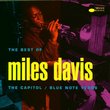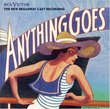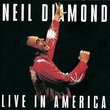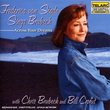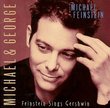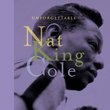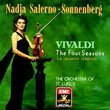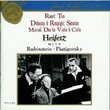| All Artists: Leonard Bernstein, Gerard Schwarz, Royal Liverpool Philharmonic Orchestra, Yvonne Kenny Title: Leonard Bernstein: Kaddish, Symphony No. 3; Chichester Psalms (Milken Archive of American Jewish Music) Members Wishing: 2 Total Copies: 0 Label: Milken Archive Original Release Date: 1/1/2005 Re-Release Date: 9/20/2005 Genre: Classical Styles: Opera & Classical Vocal, Symphonies Number of Discs: 1 SwapaCD Credits: 1 UPC: 636943945629 |
Search - Leonard Bernstein, Gerard Schwarz, Royal Liverpool Philharmonic Orchestra :: Leonard Bernstein: Kaddish, Symphony No. 3; Chichester Psalms (Milken Archive of American Jewish Music)
CD DetailsSimilarly Requested CDs
|
CD ReviewsMAZEL TOV! EXCELLENT RECORDINGS OF EXCITING, POWERFUL MUSIC. J. T Waldmann | Carmel, IN, home to the fabulous new Regional Perf | 12/16/2005 (5 out of 5 stars) "In preparation for this review, I listened to two other recordings of the "Kaddish" Symphony (Bernstein's 1967 recording - original text - with the New York Philharmonic for Sony and his 1978 recording with the Israel Philharmonic on Duetsche Grammophon). The new Naxos recording holds its own against both, and Gerald Schwartz and his Liverpool forces perform as well as Bernstein and his. This recording has the added benefit of excellent digital sound, with more detail than its earlier counterparts. The disc also includes a splendid performance of "The Chichester Psalms" in the composer's original conception - a chorus of exclusively men and boys, with no adult countertenors on the alto part. Perhaps because of this, the piece "dances" more than on other recordings, and maestro Schwartz leads the orchestra and singers through a brisk, joyous reading. (If my ears don't deceive me, except for the soprano soloist, no female voices are used in the "Kaddish" Symphony, either.) Musical Heritage Society claims the "first recording in composer's original version" with James Litton leading the American Symphony Orchestra, the New York Vocal Consort, and the American Boychoir. Originally released by Music Masters Jazz in 1994, it is neither as polished nor as well recorded as the Naxos release, but it does contain the only available recording of "I Never Saw Another Butterfly," Charles Davidson's setting for boys chorus & orchestra of children's poetry from the Terezin concentration camp. Judith Clurman writes: "The Kaddish is one of the most powerful prayers in the Jewish liturgy. A profoundly personal prayer chanted at every synagogue service, it is sometimes called the "Prayer for the Dead," as it is recited at the graveside of a deceased parent, spouse, sister, brother, loved one, or friend-although it is actually a powerful affirmation of life." (The following translation is from MISHKAN T'FILAH, the new prayer book of the Reform movement): "May Your Great Name grow in holiness in the world created as You willed. May Your majesty rule in our lifetimes, in our day and in the lifetimes of the House of Israel, speedily and soon and we answer: Amen. May Your Great Name be blessed for ever and eternity. May the Name of the Holy Blessed One be praised and lauded, glorified and exalted, honored and respected beyond any blessing, song, hymn or psalm that we on earth could offer, and we answer: Amen. For us and all Israel, may the blessing of peace and the promise of life come true, and let us say: Amen. May the One who causes peace to reign in the high heavens, let peace descend on us, and on all Israel, and on all the world, and let us say: Amen. May there be abundant peace from heaven and life. And let us say: Amen. May the source of peace send peace to all who mourn and comfort all who are bereaved. Amen." A powerful piece scored for speaker, soprano solo, adult mixed choir, boys choir, and orchestra and heavily influenced by ". . . a paramount concern of the early 1960s, survival under the threat of both atomic annihilation and spiritual and moral self-destruction as a result of ignorance and bigotry," (Neil W. Levin, in the liner notes), Bernstein's Third Symphony is, by no means, a "depressing" work. The symphony, like the prayer quoted above, affirms life and cries out for all peoples to work for peace. In his own notes about the symphony, Bernstein writes ". . . as I was finishing the final amens of the jubilant fugue which concludes the piece, the news came of the assassination of Jack Kennedy which threw me for a loop..... At that moment, I realized that I had to dedicate the piece to the beloved memory of this man whom I did indeed love very much. ...." In a 2003 interview, Jamie Bernstein Thomas, the composer's eldest daughter, said this about the symphony: "He is affirming life; he is reciting the Kaddish for people he loved, for a fallen president; he is micromanaging his struggle with his father; and perhaps even reciting the Kaddish for the six million Jews, the gypsies, gays, and other innocents who perished in the Holocaust. The piece runs the entire gamut of emotions. I hear his love, anger, warmth, struggle, and anxiety in this music." The text, written by the composer and revised in 1977 (the world premiere, with the text in Hebrew, was in Tel Aviv in December 1963, a month after President Kennedy's death), is an expression of Bernstein's deep religious faith, and, to some, may sound irreverent or even blasphemous. However, ". . . [c]onfrontations and disputations with God by men of intense faith are well rooted in a number of Jewish religious, folk, and literary traditions, beginning with biblical incidents." In a 1985 interview, Bernstein said: "They [Abraham, Moses, and the Prophets] argued with God, the way your argue with somebody who's so close to you that you love so much, that you can really fight. . . . The more you love someone, the more you can get angry with him, and when you have a reconciliation, the more close you become than ever. Something like that happens in the course of this piece. . . ." (above quotes from Levin's liner notes) Willard White is an outstanding "speaker," less theatrical than Felicia Montealegre on the Sony disc, but far more intense than Michael Wager on DG. Yvonne Kenny is a fine soprano soloist, although I prefer Montserrat Caballe's vocal richness and amazing control on DG. Even though the DG recording features the Vienna Boys' Choir, I tend to favor this Schwartz recording with its better sound and superior liner notes and wonderful "Chichester Psalms" coupling. "Mazel tov" to Naxos and the Milken Archive of American Jewish Music for this outstanding release. Also to Neil W. Levin for his scholarly and informative liner notes. No one does it better than Neil Levin. A "Classics Today" 10/10 recording. Highly recommended. " About as successful as "Kaddish" is going to get Santa Fe Listener | Santa Fe, NM USA | 09/14/2008 (5 out of 5 stars) "Bernstein's "Kaddish" Symphony remains the stepchild of his three symphonies, largley because of the lurid egotism of the spoken text, where Bernstein, speaking in his own voice, vies with Moses in arguing with God. As an act of brazen chutzpah, it didn't seem to bother the composer, but a flurry of negative reactions forced revisions to the text, none of which really erased the original distaste. I, for one, got over my embarrassment for Bernstein and have no problem digging into his exuberant 1963 recording, the text ripely declaimed by his wife, Felicia Montealegre, in the mode of a Broadway diva playing a rabbi.
Ultimately, 'Kaddish' would be better off in Hebrew, as it is performed in Israel, but Willard White gives a thnderous account of the spoken part, backed up with enrgy and conviction by Gerard Schwarz and his Liverpool orchestra -- they hit their stride much more impressively than the Bournemouth orchestra under Marin Alsop, who also record Bernstein for Naxos. Throw in superb recorded sound and an alert, dramatic chorus, and you wind up with a performance that makes as good a case for this work as it has ever had (one less plagued by Bernstein's rheotical hugeness, which overblows music that is already excessive). The reading of "Chichester Psalms' tht serves as a filler is also powerful and intense, at odds with Alsop's gentler approach. No one before Schwarz had the notion to blaze through the work, but he brings out the brash joy of the first movement and skirts the potential mawkishness of the rest. (The boy soprano here far esceeds Alsop's, by the way). As with "Kadish," I doubt that this work has ever gotten as persuasive a reading before. This whole CD deserves the acclaim it received when it was first released." |

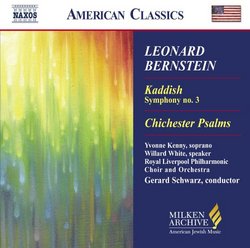
 Track Listings (10) - Disc #1
Track Listings (10) - Disc #1![Vivaldi's Ring of Mystery [With CD]](https://nationalbookswap.com/cd//m/30/0730/80730.jpg)
